| “세상은 점차 좋아지고 있지만, 그 속도는 충분히 빠르지 않고, 그 혜택이 모든 사람에게 골고루 돌아가는 것도 아닙니다. … 우리는 부유한 사람에게 돌아가는 자본주의의 혜택이 가난한 사람에게도 돌아갈 수 있게 하는 방법을 찾아야 합니다.” 마이크로소프트 빌 게이츠 회장은 지난 1월24일 스위스 다보스에서 열린 ‘세계경제포럼’ 연설에서 ‘창조적 자본주의(creative capitalism)’를 역설했다. 그는 “자본주의는 유익하고 지속가능한 방식으로 자기이익을 활용하지만, 오로지 지급능력이 있는 사람에게만 그 혜택을 준다”며 “가난한 사람들이 신속하게 혜택을 누릴 수 있도록 하려면 지금보다 훨씬 나은 방식으로 혁신적인 사람들과 기업을 활용할 수 있는 시스템이 필요하다”고 강조했다. 게이츠는 “기업이 가난한 사람들에게 서비스를 제공한다고 해서 항상 수익을 얻을 수 있는 것은 아니다”라며 “이런 경우 또 다른 시장에 기반을 둔 인센티브가 필요하며, 이 인센티브가 바로 인지도”라고 말했다. 그의 연설 전문을 영한대역으로 싣는다. |
| Thank you for that welcome and for the privilege of speaking at this forum. This is the last time I will come to Davos as a full-time employee of Microsoft. Some of us are lucky enough to arrive at moments in life where we can pause, reflect on our work, and say: “This is great. It´s fun, exciting, and useful-I could do this forever.” But the passing of time forces each of us to take stock and ask: What have I accomplished so far? What do I still want to accomplish? Thirty years, twenty years, ten years ago, my focus was totally on how the magic of software could change the world. I believed that breakthroughs in technology could solve the key problems. And they do-increasingly-for billions of people. But breakthroughs change lives only where people can afford to buy them-only where there is economic demand. And economic demand is not the same as economic need. |
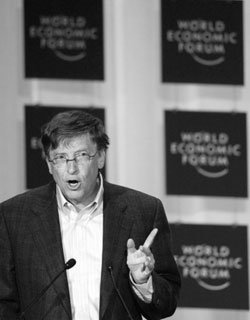
우리 중에는 인생의 어느 순간에 자신의 일에 대해 “멋진 일이야. 재미있고 신나고 보람 있어. 평생 이 일을 할 수 있을 거야”라고 말할 수 있는 행운을 누리는 사람들이 있습니다.
하지만 세월이 흐르면 우리는 어쩔 수 없이 스스로를 살펴보고 이런 질문을 하게 마련입니다. 나는 지금까지 무엇을 이루었는가? 앞으로 또 어떤 일을 이루려고 하는가?
30년, 20년, 10년 전 저는 소프트웨어의 마술로 세계를 변화시키는 방법을 생각하느라 여념이 없었습니다. 저는 획기적인 기술 발전이 중요한 문제들을 해결해 줄 것이라고 믿었습니다. 그리고 수 억 인구의 문제가 점점 더 많이 해결되고 있습니다.
하지만 이런 획기적인 기술 발전은 지급할 능력이 있는 사람들, 즉 경제적 수요를 가진 사람들의 생활만을 변화시키고 있습니다. 또한 경제적 수요는 경제적 필요와 동일하지 않습니다.
| There are billions of people who need the great inventions of the computer age, and many more basic needs as well. But they have no way of expressing their needs in ways that matter to markets. So they go without. If we are going to have a serious chance of changing their lives, we will need another level of innovation. Not just technology innovation-we need system innovation. That´s what I want to discuss with you here in Davos today. |
수십억 인구가 컴퓨터 시대의 위대한 발명품과, 더불어 수많은 기본 제품을 필요로 하고 있습니다. 하지만 그들에게는 시장이 중시하는 방식으로 자신의 필요를 표현할 방법이 없습니다. 그래서 필요가 충족되지 않은 상태로 생활하고 있습니다.
우리가 이들의 삶을 변화시킬 수 있는 진정한 기회를 가지려고 한다면, 또 다른 차원의 혁신이 필요합니다. 단순히 테크놀로지의 혁신이 아닙니다. 시스템의 혁신이 필요합니다.
저는 오늘 이 자리에서 여러분과 바로 이런 이야기를 나누려고 합니다.
| Let me begin by expressing a view that might not be widely shared. The world is getting better. In significant and far-reaching ways, the world is a better place to live than it has ever been. Consider the status of women and minorities in society-virtually any society- compared to any time in the past. Consider that life expectancy has nearly doubled in the past 100 years. Consider governance-the number of people today who vote in elections, express their views, and enjoy economic freedom compared to any time in the past. In these crucial areas, the world is getting better. |
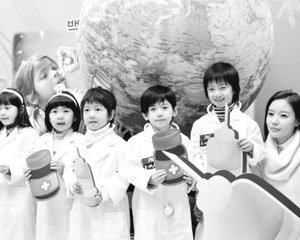
1월 7일 이마트 용산역점에서 열린 ‘꽃들에게 희망을-천원의 기적’에 참가한 탤런트 김아중과 어린이들이 대형 지구본과 주사기 앞에서 개발도상국 백신 지원 캠페인을 벌였다.
세상은 점점 나아지고 있습니다. 중요하고 광범위한 측면에서 세상은 그 어느 때보다 살기 좋은 곳이 되었습니다.
과거 그 어떤 순간과 비교해서 오늘날 거의 모든 사회에서 여성과 소수자의 위상이 어떤지를 생각해봅시다. 기대수명이 과거 100년 동안 거의 두 배가 된 것을 생각해봅시다.
정치경제적 체제를 생각해봅시다. 오늘날 과거 그 어느 순간과 비교해서 선거권을 갖고 자신의 의사를 표현하며, 경제적인 자유를 누리는 사람의 수가 얼마나 되는지를 말입니다.
이런 중요한 영역에서 세상은 좋아지고 있습니다.
| These improvements have been matched, and in some cases triggered, by advances in science, technology, and medicine. They have brought us to a high point in human welfare. We are at the start of a technology-driven revolution in what people will be able to do for one another. In the coming decades, we will have astonishing new abilities to diagnose illness, heal disease, educate the world´s children, create opportunities for the poor, and harness the world´s brightest minds to solve our most difficult problems. This is how I see the world, and it should make one thing clear: I am an optimist. |
이러한 개선들은 과학, 기술, 의학 등의 발전과 맞물렸거나 이러한 것들에 의해 촉발되었습니다. 덕택에 인류 복지는 높은 수준에 이르게 되었습니다. 우리는 기술 혁명을 발판으로 서로 이바지할 수 있게 될 것입니다. 향후 몇십년 동안 우리는 질병을 진단하고 치료하며 세계의 어린이들을 교육하고 가난한 사람들을 위한 기회를 창출하고 세계의 인재들을 활용하여 가장 어려운 문제들을 해결할 수 있는 놀랍도록 새로운 능력을 갖게 될 것입니다.
이것이 제가 세상을 보는 시각이며, 이를 통해 한 가지 사실이 분명해집니다. 제가 낙관주의자라는 사실이죠.
| But I am an impatient optimist. The world is getting better, but it´s not getting better fast enough, and it´s not getting better for everyone. The great advances in the world have often aggravated the inequities in the world. The least needy see the most improvement, and the most needy see the least-in particular the billion people who live on less than a dollar a day. There are roughly a billion people in the world who don´t get enough food, who don´t have clean drinking water, who don´t have electricity, the things that we take for granted. Diseases like malaria that kill over a million people a year get far less attention than drugs to help with baldness. Not only do these people miss the benefits of the global economy-they will suffer from the negative effects of economic growth they missed out on. Climate change will have the biggest effect on people who have done the least to cause it. |
하지만 저는 조급한 낙관주의자입니다. 세상은 점차 좋아지고 있지만, 그 속도는 충분히 빠르지 않고, 그 혜택이 모든 사람에게 골고루 돌아가는 것도 아닙니다.
세상의 위대한 발전은 종종 세상의 불평등을 심화시켰습니다. 진보의 혜택은 부족한 것이 없는 사람들에게 가장 많이 돌아가고, 부족한 것이 가장 많은 사람들, 특히 하루에 1달러 미만의 생계비로 살아가는 십억 인구가 그 혜택을 가장 적게 보고 있습니다.
우리는 당연하게 생각하며 누리고 있지만 지구상에는 충분히 먹지 못하고, 깨끗한 물을 마시지 못하고, 전기를 이용하지 못하는 사람이 약 10억 명에 달합니다.
1년에 수백만 명의 목숨을 빼앗아가는 말라리아 같은 질병보다 대머리 치료제가 훨씬 더 큰 주목을 받고 있습니다.
가난한 사람들은 글로벌 경제의 혜택을 보지 못할 뿐 아니라, 자신들이 누리지도 못한 경제적 성장의 부정적인 영향으로 고통을 받게 될 것입니다. 기후 변화는 그 원인을 가장 적게 제공한 사람에게 가장 큰 영향을 미치게 될 것입니다.
| Why do people benefit in inverse proportion to their need? Market incentives make that happen. In a system of pure capitalism, as people´s wealth rises, the financial incentive to serve them rises. As their wealth falls, the financial incentive to serve them falls-until it becomes zero. We have to find a way to make the aspects of capitalism that serve wealthier people serve poorer people as well. The genius of capitalism lies in its ability to make self-interest serve the wider interest. The potential of a big financial return for innovation unleashes a broad set of talented people in pursuit of many different discoveries. This system driven by self-interest is responsible for the great innovations that have improved the lives of billions. But to harness this power so it benefits everyone-we need to refine the system. |
왜 사람들의 필요와 혜택이 반비례하는 것입니까? 시장 인센티브 때문에 그렇습니다.
순수 자본주의 체제에서는 사람들의 부가 증가하면 이들에게 돌아가는 금융적 인센티브도 증가합니다. 사람들의 부가 줄어들면 금융적 인센티브도 영(零)이 될 때까지 감소합니다. 우리는 부유한 사람에게 돌아가는 자본주의의 혜택이 가난한 사람에게도 돌아갈 수 있게 하는 방법을 찾아야 합니다.
자본주의 정신은 자기이익이 보다 광범위한 이익에 이바지할 수 있도록 만드는 능력에 있습니다. 혁신의 대가로 상당한 재정적 소득을 얻을 수 있는 가능성이 있기에 각계각층의 인재들이 다양한 발견에 나서고 있습니다. 자기이익 추구를 중심으로 한 이런 시스템은 수십억의 삶을 향상시킨 위대한 혁신의 원인이 되었습니다.
하지만 이런 능력을 활용하여 모든 사람이 그 혜택을 누리도록 하기 위해서 우리는 이 시스템을 재정비해야 합니다.
| As I see it, there are two great forces of human nature: self-interest, and caring for others. Capitalism harnesses self-interest in helpful and sustainable ways, but only on behalf of those who can pay. Philanthropy and government aid channel our caring for those who can´t pay, but the resources run out before they meet the need. But to provide rapid improvement for the poor we need a system that draws in innovators and businesses in a far better way than we do today. Such a system would have a twin mission: making profits and also improving lives for those who don´t fully benefit from market forces. To make the system sustainable, we need to use profit incentives whenever we can. |
제 생각에 인간의 본성에는 두 가지 위대한 힘이 있습니다. 자기이익과 타인에 대한 관심입니다. 자본주의는 유익하고 지속가능한 방식으로 자기이익을 활용하지만, 오로지 지급 능력이 있는 사람들에게만 그 혜택을 줍니다. 자선단체와 정부는 경제적 능력이 없는 사람들을 향해 우리의 관심이 집중될 수 있도록 도움을 주지만, 이들의 필요를 채우기 전에 자원은 바닥이 납니다. 하지만 가난한 사람들이 신속하게 진보의 혜택을 누릴 수 있도록 하기 위해서는 지금보다 훨씬 나은 방식으로 혁신적인 사람들과 기업을 활용할 수 있는 시스템이 필요합니다.
이러한 시스템은 두 가지 사명을 갖게 될 것입니다. 즉 이익을 창출하는 동시에 시장의 힘으로부터 충분한 혜택을 누리지 못하는 사람들의 삶을 개선하는 것입니다. 이런 시스템이 지속적으로 유지되려면, 가능하면 언제든지 이익이라는 인센티브를 제공해야 합니다.
| At the same time, profits are not always possible when business tries to serve the very poor. In such cases, there needs to be another market-based incentive-and that incentive is recognition. Recognition enhances a company´s reputation and appeals to customers; above all, it attracts good people to the organization. As such, recognition triggers a market-based reward for good behavior. In markets where profits are not possible, recognition is a proxy; where profits are possible, recognition is an added incentive. The challenge is to design a system where market incentives, including profits and recognition, drive the change. |
기업이 가난한 사람들에게 서비스를 제공하면서 항상 수익을 얻을 수 있는 것은 아닙니다. 이런 경우에 시장 기반의 또 다른 인센티브가 필요하며, 이 인센티브는 바로 인지도입니다. 인지도는 기업의 평판을 향상시키는 동시에 소비자에게 호감을 줍니다. 무엇보다 인지도는 우수한 인재를 조직으로 끌어들입니다. 그렇기 때문에 인지도는 시장에 기반을 둔 선행(善行)에 대한 보상을 유발합니다. 이익을 실현할 수 없는 시장에서 인지도는 대용물이 되고, 이익 실현이 가능한 경우에 인지도는 부가적인 인센티브가 됩니다.
문제는 이익 및 인지도를 포함한 시장 인센티브가 변화를 주도하는 시스템을 설계하는 것입니다.
| I like to call this new system creative capitalism-an approach where governments, businesses, and nonprofits work together to stretch the reach of market forces so that more people can make a profit, or gain recognition, doing work that eases the world´s inequities. Some people might object to this kind of “market-based social change”-arguing that if we combine sentiment with self-interest, we will not expand the reach of the market, but reduce it. Yet Adam Smith-the father of capitalism and the author of Wealth of Nations, who believed strongly in the value of self-interest for society- opened his first book with the following lines: “How selfish so ever man may be supposed, there are evidently some principles in his nature, which interest him in the fortunes of others, and render their happiness necessary to him, though he derives nothing from it, except the pleasure of seeing it.” |
저는 이 새로운 시스템을 창조적 자본주의(creative capitalism)라고 부르고 싶습니다. 이는 정부, 기업, 비영리단체가 협력하여 시장 혜택의 범위를 확장함으로써 좀 더 많은 사람이 세계의 불평등을 완화하는 일을 하면서 이익을 창출하거나 인지도를 얻을 수 있는 방식입니다.
어떤 사람들은 ‘시장을 기반으로 한 사회적 변화’에 반대하며, 만일 우리가 감정과 자기이익을 결합시킨다면 시장혜택은 확대되는 것이 아니라 축소될 것이라고 주장합니다. 하지만 자본주의의 아버지이자 ‘국부론’의 저자로 사회에서 자기이익의 가치를 굳게 믿었던 애덤 스미스는 자신의 첫 번째 저서에 다음과 같은 서문을 썼습니다.
“아무리 이기적으로 보이는 사람이라도 그의 본성에는, 타인의 운명에 관심을 갖고 단지 타인의 행복을 보는 것 외에는 달리 얻을 것이 없다 하더라도 타인의 행복을 자기의 행복으로 삼게 하는 어떤 원리가 자리 잡고 있다.”
| Creative capitalism takes this interest in the fortunes of others and ties it to our interest in our own fortunes-in ways that help advance both. This hybrid engine of self-interest and concern for others serves a much wider circle of people than can be reached by self-interest or caring alone. My thinking on this subject has been influenced by many different experiences, including our work at Microsoft to address inequity. For the past 20 years, Microsoft has used corporate philanthropy as a way to bring technology to people who don´t have access. We´ve donated more than billion in cash and software to try to bridge the digital divide, and that will continue. |
창조적 자본주의는 타인의 운명에 관심을 가지며 이를 상호 도움이 되는 방식으로 우리 자신의 운명과 연결시킵니다. 자기이익과 타인에 대한 관심이라는 하이브리드 엔진은 자기이익이나 관심만으로 도달할 수 있는 것보다 훨씬 더 넓은 인간계층의 이익에 이바지합니다.
이 주제에 대한 제 생각은 불평등을 해결하기 위해 마이크로소프트에서 하는 일을 포함하여 여러 가지 경험을 통해 형성되었습니다.
과거 20년 동안 마이크로소프트는 기업의 자선활동을 기술에 접근할 수 없는 사람들에게 테크놀로지를 선사하는 방법으로 펼쳤습니다. 우리는 디지털 격차를 좁히기 위해서 30억달러 이상의 현금과 소프트웨어를 기증했으며, 그 일은 앞으로도 계속될 것입니다.
| But our greatest impact is not just free or inexpensive software by itself, but rather when we show how to use technology to create solutions. And we´re committed to bring more of that expertise to the table. Our product and business groups throughout the world, and some of our very best minds at our research lab in India, are working on new products, technologies, and business models that can make computing more accessible and more affordable. In one case, we´re developing a text-free interface that will enable illiterate or semi-literate people to use a PC instantly, with minimal training or assistance. In another we´re looking at how wireless technology, together with software, can avoid the expensive connectivity costs that stand in the way of computing access in rural areas. we´re thinking in a much more focused way about the problems that the poorest people face, and giving our most innovative thinkers the time and resources to come up with solutions. |
우리가 끼친 가장 큰 영향력은 그저 무료 혹은 저렴한 소프트웨어를 제공하는 것이 아니라 기술을 통해 해결책을 창출하는 방법을 보여주는 것입니다. 그리고 우리는 이런 전문지식을 더 많이 제공하기 위해 적극 노력하고 있습니다. 전세계에 있는 우리의 제품 및 비즈니스 그룹과 인도의 연구소에 있는 뛰어난 인재들은 컴퓨팅을 보다 접근이 용이하고 저렴하게 만들 수 있는 제품, 테크놀로지, 비즈니스 모델을 만들기 위해 일하고 있습니다. 한 가지 예를 들면, 우리는 문맹자나 반문맹자가 최소한의 훈련이나 지원을 받고도 즉각적으로 PC를 사용할 수 있도록 비문자 방식 인터페이스(text-free interface)를 개발하고 있습니다. 또 다른 예를 들면 우리는 무선 테크놀로지와 소프트웨어를 결합하여 농어촌지역에서 컴퓨팅 접근에 방해가 되는 높은 연결 비용 문제를 해결할 방법을 모색하고 있습니다. 우리는 가난한 사람들이 겪는 문제에 중점을 두고 생각하고 있으며, 가장 혁신적인 사고방식을 가진 직원들에게 해결책을 내놓을 수 있도록 시간과 자원을 부여하고 있습니다.
| This kind of creative capitalism matches business expertise with needs in the developing world to find markets that are already there, but are untapped. Sometimes market forces fail to make an impact in developing countries not because there´s no demand, or because money is lacking, but because we don´t spend enough time studying the needs and limits of that market. This point was made eloquently in C.K. Prahalad´s book ‘The Fortune at the Bottom of the Pyramid’, and that´s had a huge influence on companies in terms of stretching the profit motive through special innovation. |
이런 창조적인 자본주의는 이미 존재하고 있지만 아직 활용되고 있지 않은 시장을 발견하기 위해 비즈니스 전문지식을 개발도상국의 필요와 결합시킵니다. 때로 시장의 힘은 개발도상국에서 영향력을 미치지 못합니다. 그 이유는 수요가 없거나 자금이 부족해서가 아니라 이런 시장의 필요와 한계를 연구하는 데 충분한 시간을 할애하지 않기 때문입니다.
이런 생각은 C. K. 프라할라드(C. K. Prahalad)의 저서인 ‘‘저소득층 시장을 공략하라’’에서 설득력 있게 풀어내고 있으며, 특별한 혁신을 통한 이익 동기 확장이라는 측면에서 여러 기업에 막대한 영향력을 끼쳤습니다.
| When the World Health Organization tried to expand vaccination for meningitis in Africa, it didn´t go straight to a vaccine manufacturer. It first went to Africa to learn what people could pay. They found out that if they wanted mothers to get this vaccine for their babies, it had to be priced under 50 cents a dose. Then they challenged the partners to meet this price, and, in fact, Serum Institute in India found a new way to make the vaccine for 40 cents each. They company agreed to supply 250 million doses to distribute through public health systems over the next decade, and they are free to sell it directly to the private sector too. |
세계보건기구가 아프리카에서 뇌막염 백신 보급을 확대시키고자 했을 때, 이 기구는 백신 제조업체로 곧장 찾아가지 않았습니다. 먼저 아프리카로 가서 사람들의 지불 능력을 확인했습니다. 산모가 아기에게 백신을 맞히도록 하려면 1회당 50센트 미만이어야 한다는 것을 알게 되었습니다. 그래서 이 기구는 이 가격에 맞춰주도록 협력업체에 요청했고, 인도의 세럼 인스티튜트(Serem Institute)는 1회당 40센트 상당의 백신을 만들 수 있는 새로운 방법을 발견했습니다. 이 회사는 향후 10년에 걸쳐 공중보건시스템을 통해 2억5000만회 분을 공급하기로 동의했고, 이 백신을 민간부문에도 자유롭게 판매하게 되었습니다.
| In another case, a Dutch company, which holds the rights to a cholera vaccine, retains the rights in the developed world, but shares those rights with manufacturers in developing countries. The result is a cholera vaccine made in Vietnam that costs less than a dose-and that includes delivery and the costs of an immunization campaign. There are a number of industries that can take advantage of this kind of tiered pricing to offer valuable medicine and technology to low-income people. These projects are just a hint of what we could accomplish if people who are experts on the needs in the developing world would meet several times a year with scientists at software or drug companies and help them try to find poor world applications for their best ideas. |
또 다른 사례로 콜레라 백신에 대한 특허권을 보유한 한 네덜란드 회사가 있습니다. 이 회사는 선진국에서는 특허권을 유지하되 개발도상국에서는 제조업체와 이를 공유하고 있습니다. 결과적으로 베트남에서는 1회당 1달러 미만인 콜레라 백신이 나오게 되었고, 이 가격은 전달 및 백신접종 캠페인에 드는 비용을 포함한 것입니다. 이런 가격차별정책을 통해 저소득층에게 가치 있는 의학과 기술을 제공할 수 있는 산업이 많습니다.
이런 프로젝트는 개발도상국의 필요를 잘 알고 있는 사람들이 1년에 몇 차례씩 소프트웨어 전문가나 제약회사와 만남을 갖고 이들이 갖고 있는 최고의 아이디어를 가난한 나라에서도 활용할 수 있도록 도움을 줌으로써 성취할 수 있는 일들에 대한 힌트에 불과합니다.
| Another approach to creative capitalism includes a direct role for governments. Of course, governments do a great deal to help the poor in ways that go far beyond nurturing markets: they fund research, subsidize health care, build schools and hospitals. But some of the highest-leverage work that government can do is to set policy and disburse funds in ways that create market incentives for business activity that improves the lives of the poor. Under a law signed by President Bush last year, any drug company that develops a new treatment for a neglected disease like malaria or TB can get priority review from the Food and Drug Administration for another product they´ve made. If you develop a new drug for malaria, your profitable cholesterol-lowering drug could go on the market a year earlier. This priority review could be worth hundreds of millions of dollars. |
창조적 자본주의에 대한 또 다른 접근법은 정부의 직접적인 역할을 수반합니다. 물론 정부는 가난한 사람들을 돕기 위해 시장 육성을 넘어 다각도로 노력하고 있습니다. 연구에 재정적인 지원을 하고, 보건 보조금을 지급하며, 학교와 병원을 건립합니다. 하지만 정부가 할 수 있는 가장 영향력 있는 일은 가난한 사람들의 삶을 향상시키는 비즈니스 활동에 대해 시장 인센티브를 창출하는 방향으로 정책을 수립하고 기금을 배분하는 것입니다.
지난해 부시 대통령이 서명한 법률에 의해, 말라리아나 결핵과 같이 무시되고 있는 질병에 대한 새로운 치료법을 개발하는 제약회사는 자사가 만드는 또 다른 제품에 대해 식품의약국(FDA)으로부터 우선 심사를 받을 수 있습니다. 만약 여러분이 새로운 말라리아 치료제를 개발했다면, 수익성이 높은 콜레스테롤 저하제를 1년 먼저 출시할 수 있습니다. 이런 우선 심사의 가치는 수백억달러에 달합니다.
| Another approach to creative capitalism is simply to help businesses in the poor world reach markets in the rich world. Tomorrow morning I will announce a partnership that gives African farmers access to the premium coffee market, with the goal of doubling their income from their coffee crops. This project will help African farmers produce high-quality coffee and connect them to companies that want to buy it. That will help lift them, their families, and their communities out of poverty. |
창조적 자본주의에 대한 또 다른 접근법은 가난한 나라의 기업이 부자 나라의 시장에 접근할 수 있도록 도와주는 것입니다. 저는 내일 아침 아프리카 농부들이 프리미엄 커피 시장에 접근할 수 있도록 하는 파트너십을 선언할 것이며, 그 목적은 커피 수확을 통한 농가 소득을 배가시키기 위한 것입니다. 이 프로젝트는 아프리카 농부들이 양질의 커피를 생산하고 또 이들이 구매를 원하는 기업에 접근할 수 있도록 도움을 줄 것입니다. 이렇게 되면 농가와 농촌 공동체가 가난에서 벗어나기가 한결 수월해질 것입니다.
| Finally, one of the most inventive forms of creative capitalism involves someone we all know very well. A few years ago, I was sitting in a bar here in Davos with Bono. After Asia and most of Europe and Africa had gone to bed, he was on fire, talking about how we could get a percentage of each purchase from civic-minded companies to help change the world. He kept calling people, waking them up, and handing me the phone. His projections were a little enthusiastic at first? but his principle was right. If you give people a chance to associate themselves with a cause they care about? they will pay more, and that premium can make an impact. That was how the RED Campaign was born, here in Davos. |
마지막으로 창조적 자본주의의 가장 독창적인 형태는 우리 모두가 익히 알고 있는 어떤 사람과 관련이 있습니다.
몇 년 전에 저는 여기 다보스에 있는 한 술집에서 보노(Bono·기업의 사회적 책임론을 지지하는 아일랜드의 록 스타-편집자 주)와 자리를 함께했습니다. 아시아와 유럽 대부분과 아프리카가 잠이 든 그 시각에, 보노는 공공의식이 있는 기업의 제품을 구매할 때 가격의 1%를 떼어 세상을 변화시키는 일에 사용하는 방법에 대해 열변을 토했습니다. 그는 계속해서 사람들에게 전화를 걸어 그들을 깨우고 제게 전화기를 건네주었습니다. 처음에는 다소 의욕이 앞서는 계획으로 보였지만, 그의 원리는 옳았습니다. 여러분이 사람들에게 그들이 관심을 갖는 명분과 연결될 수 있는 기회를 준다면, 그들은 좀 더 내놓을 것이고 그 프리미엄으로 영향력을 발휘할 수 있습니다. 이렇게 해서 여기 다보스에서 레드(RED) 캠페인(기업의 제품과 자선 기부를 연계하는 캠페인으로 보노가 주창하였다-편집자주)이 탄생한 것입니다.
| RED products are available from companies like Gap, Motorola, and Armani. Just this week, Dell and Microsoft joined the cause. Over the last year and a half, RED has generated million for the Global Fund to Fight AIDS, TB, and Malaria. As a result, nearly 2 million people in Africa are receiving life-saving drugs today. What unifies all forms of creative capitalism is that they´re market-driven efforts to bring solutions we take for granted to people who can´t get them. As we refine and improve this approach, there is every reason to believe these engines of change will become larger, stronger, and more efficient. |
RED 제품은 갭, 모토롤라, 아르마니 같은 기업에서 구입할 수 있습니다. 이번 주만 하더라도 델과 마이크로소프트가 이 일에 동참했습니다. 지난 1년 반에 걸쳐 RED는 에이즈, 결핵, 말라리아 퇴치를 위한 글로벌 기금으로 5000만달러를 조성했습니다. 그 결과 현재 아프리카에서 200만에 달하는 사람이 생명을 유지할 수 있는 약을 얻고 있습니다.
모든 형태의 창조적 자본주의의 공통점은 우리가 당연하게 여기는 것들을 갖지 못한 사람들에게 해결책을 안겨주기 위해 시장을 기반으로 이루어지는 노력이라는 것입니다. 우리가 이런 방식을 다듬고 개선한다면, 어느 모로 보나 이 변화의 엔진이 더 커지고 더 강력해지고 더 효율적이 되리라고 생각합니다.
| There is a growing understanding around the world that when change is driven by market-based incentives, you have a sustainable plan for change-because profits and recognition are renewable resources. Klaus Schwab runs a foundation that assists social entrepreneurs around the world, men and women who turn their ideas for improving lives into affordable goods or services. President Clinton demonstrates the unique role that a non-profit can play as a deal-maker between rich world producers and poor world consumers. The magazine Fast Company gives awards for what they call Social Capitalism. These are not a few isolated stories; this is a world-wide movement, and we all have the ability and the responsibility to accelerate it. |
변화가 시장 기반 인센티브에 의해 주도될 때, 변화를 위한 지속가능한 계획을 갖게 된다는 점에 대해 세계적으로 이해가 확산되고 있습니다. 이익과 인지도는 재생 가능한 자원이기 때문입니다. 클라우스 슈왑(Klaus Schwab)이 운영하는 재단은 삶을 향상시킬 수 있는 아이디어를 제품이나 서비스로 만들어내는 전세계의 사회적 기업과 개인을 지원하고 있습니다. 클린턴 대통령은 부유한 나라의 제조업자와 가난한 나라의 소비자를 연결해주는 비영리기관의 독특한 역할을 보여줍니다. ‘패스트 컴퍼니(Fast Company)’라는 잡지는 소위 사회적 자본주의(Social Capitalism)에 상을 수여합니다.
제가 말씀드린 것들은 산발적인 예가 아니라 세계적인 움직임이며, 우리 모두에게는 이 움직임을 가속시킬 능력과 책임이 있습니다.
| I´d like to ask everyone here-whether you´re in business, government or the non-profit world-to take on a project of creative capitalism in the coming year. It doesn´t have to be a new project; you could take an existing project, and see where you might stretch the reach of market forces to help push things forward. When you award foreign aid, when you make charitable gifts, when you try to change the world-can you also find ways to put the power of market forces behind the effort to help the poor? |
사업을 하든, 정부나 비영리 집단에 몸담고 있든 여기에 계신 모든 분에게 앞으로 창조적 자본주의 프로젝트에 참여하시라고 부탁드리고 싶습니다. 새로운 프로젝트일 필요는 없습니다. 기존 프로젝트를 바탕으로, 시장의 힘이 미치는 영역을 확대시킬 수 있는 곳을 살펴봄으로써 일이 진전되도록 도움을 주실 수 있습니다. 외국에 원조를 하거나 기부를 통해 세상을 변화시키고자 한다면, 시장의 힘이 가난한 사람들을 도우려는 노력을 뒷받침 할 수 있는 방법도 함께 찾아주시지 않겠습니까?
| I hope corporations will consider dedicating a percentage of your top innovators´ time to issues that could help people left out of the global economy. This kind of contribution is much more powerful than simply giving away cash, or offering your employees time off to volunteer. It is a focused use of what your company does best. It is a great form of creative capitalism, because it takes the brainpower that makes life better for the richest, and dedicates it to improving the lives of everyone else. There are a number of pharmaceutical companies-GlaxoSmithKline in particular- that are putting their top innovators to work on new approaches to help the poor. Other companies are doing the same-in food, technology, cell phones. If we could take the leaders in these areas as models, and get the rest to match them, we could make a dramatic impact against the world´s inequities. |
저는 기업들이 가장 혁신적인 직원들의 시간 중 1%를 글로벌 경제에서 소외된 사람을 돕는 문제에 할애하는 것을 생각해 보았으면 합니다. 이런 기여는 단순히 현금을 나눠주거나 직원들에게 자원봉사할 시간을 주는 것보다 훨씬 강력합니다. 이것은 여러분의 회사가 가장 잘할 수 있는 것을 집약적으로 활용하는 것입니다. 이것은 부유한 사람들의 삶을 향상시키는 두뇌집단을 모든 이의 삶을 향상시키는 일에 투입하기 때문에 창조적 자본주의의 위대한 형태라고 볼 수 있습니다.
글락소스미스클라인같이 최고로 혁신적인 인력을 활용해 가난한 사람들을 도울 수 있는 새로운 방법을 연구하도록 하는 제약 회사가 많이 있습니다. 식품, 테크놀로지, 휴대전화업계의 다른 회사들도 동일한 일을 하고 있습니다. 우리가 이런 분야의 지도자들을 모델로 삼고, 나머지 사람들이 이들과 대등한 위치에 서도록 한다면, 세상의 불평등과 맞서는 극적인 힘을 발휘할 수 있습니다.
| Finally, I hope that the great thinkers here will dedicate some time to finding ways for businesses, governments, NGOs, and the media to create measures of what companies are doing to use their power and intelligence to serve a wider circle of people. This kind of information is an important element of creative capitalism. It can turn good works into recognition, and ensure that recognition brings market-based rewards to businesses that do the most work to serve the most people. We are living in a phenomenal age. If we can spend the early decades of the 21st century finding approaches that meet the needs of the poor in ways that generate profits and recognition for business, we will have found a sustainable way to reduce poverty in the world. This task is open-ended. It can never be finished. But a passionate effort to answer this challenge will help change the world. |
끝으로 저는 원대한 생각을 갖고 계신 여러분이 시간을 내서 기업과 정부, 비정부기관과 미디어를 위해 기업들이 자신의 능력과 지혜를 사용해 더 넓은 인간계층에 기여하기 위해 무엇을 하고 있는지를 측정할 수 있는 수단을 만들어주실 것을 당부드립니다. 이런 정보는 창조적 자본주의의 중요한 요소입니다. 이런 정보는 훌륭한 일을 인지도로 변모시킬 수 있고, 가장 많은 사람에게 기여하기 위해 가장 많은 일을 하는 기업이 인지도를 통해 시장 기반의 보상을 받도록 해줄 수 있습니다.
우리는 경이로운 시대에 살고 있습니다. 만일 우리가 21세기의 처음 몇십년을 기업의 이익과 인지도를 창출하는 방식으로 가난한 사람의 필요를 충족시킬 수 있는 방법을 찾는 일에 할애한다면, 세상에서 빈곤을 축소시킬 수 있는 지속가능한 방법을 발견하게 될 것입니다. 이 과제는 열려 있습니다. 결코 끝이 있을 수 없습니다. 하지만 이런 과제를 해결하려는 열정적인 노력은 세계를 변화시키는 힘이 될 것입니다.
















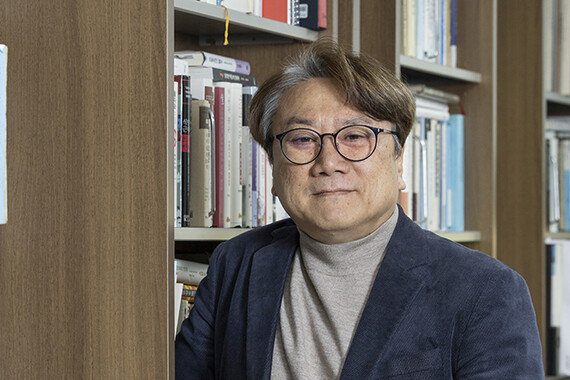

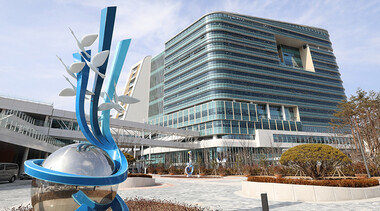

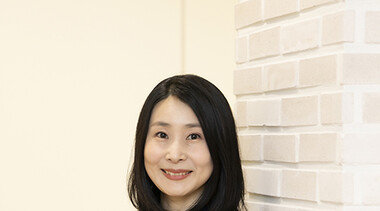
![[신동아 만평 ‘안마봉’] 2026년 ‘반중 지도자군(群)’의 행진](https://dimg.donga.com/a/380/211/95/1/ugc/CDB/SHINDONGA/Article/69/9e/7c/5e/699e7c5e023ba0a0a0a.png)
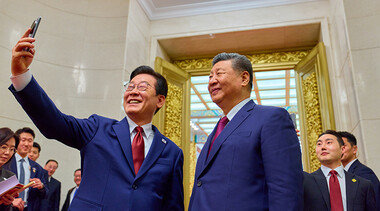
![[영상] 김다현 “언제나 내 편인 ‘얼씨구다현’과 함께 붉은 말처럼 달리렵니다”](https://dimg.donga.com/a/380/211/95/1/ugc/CDB/SHINDONGA/Article/69/8b/df/02/698bdf022269d2738e25.jpg)